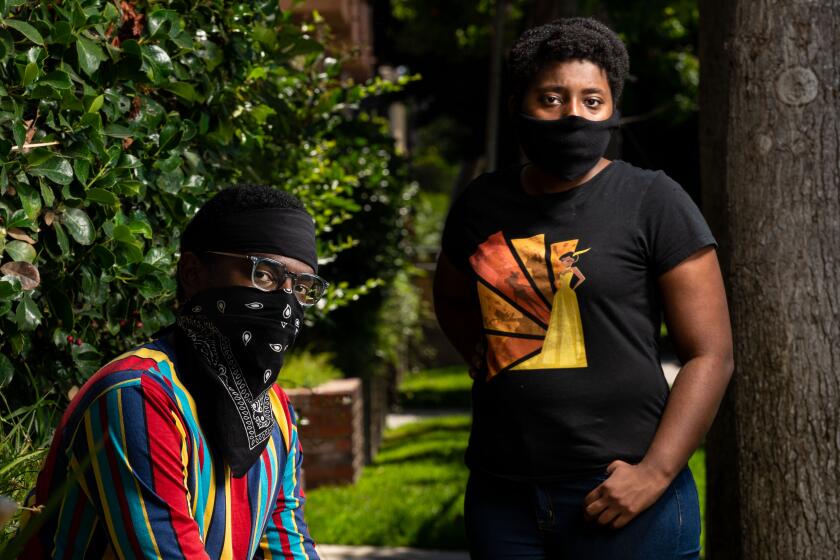Review: In Hulu’s new TV show, a Black cartoonist gets ‘Woke.’ But don’t expect a sermon
Lamorne Morris, who was never not funny as Winston Bishop in “New Girl,” has a new show, “Woke,” in which he takes center stage. Premiering Wednesday on Hulu, it is inspired by the life and work of comics artist Keith Knight (“The K Chronicles,” “The Knight Life”), who created the show with Marshall Todd (“Barbershop”), and it’s a mutually good fit for actor and series — smart, likable, a little weird, hard to pin down.
A largely successful mix of genres and themes — some romance, some wacky cohabitation comedy and some social satire, regarding identity, authenticity, justice, performative rage and real exhaustion — “Woke” does sometimes go just where you might expect, but more often does not. Set in and more than usually about San Francisco (represented by stock shots, a drag queen and Vancouver, Canada), it is timely enough that the novel coronavirus is mentioned — production wrapped at the end of February — but not so timely that more than one person is seen wearing a mask.
The epigram that begins the series, “Inspired by one experience… shared by many,” suggests that we are going to see something of broad social import but that “one experience” matters as much as “shared by many,” if not more. “Woke” is political, but not polemical — a conversation, not a sermon. And if it is a story about race, it’s also one of a more or less reasonable person in a world of knuckleheads, trying to make sense of himself.
Morris plays Keef, the Knight stand-in, creator of a locally published popular comic strip called “Toast-n-Butter” that is about to go into syndication. He is ready to move up and move out of the apartment he shares with Clovis (T. Murph) and Gunther (Blake Anderson) and into a condominium with his lawyer girlfriend, and if you have seen television before, you know that this is not going to happen. Home is where the wacky best friends are. Clovis gets by reselling limited-edition sneakers and approaches women with tired pickup lines and absurd lies. (This sounds bad on paper; his character fills out in practice.) As Gunther, Anderson is not far from the spacey stoner he played on “Workaholics,” though he has more dimension here, more plausibility. We meet him trying to sell his roommates on investing in a new waterless “energy drink” that is basically cocaine.
Amid nationwide marches for Black lives, Black animation professionals speak about systemic racism in the industry and the need for diversity.
Hanging out at his neighborhood comics store one day, Keith is approached excitedly by Ayana (Sasheer Zamata, formerly of “Saturday Night Live”). She runs an alternative paper, the Bay Arean, which comes out sounding like Bay Aryan; I’m not sure this is meant to be a joke, since no one comments on it, but it sticks out.
“I … love how ‘T&B’ talks about race and color in America,” she tells Keef. “When toast gets too dark and the man scrapes it off and puts butter on it. Facts.”
“Wow, that’s the first time I heard that one,” says Keith, who claims he is not controversial.
“You’re a Black cartoonist, you’re controversial just by existing.”
“Why is it us people of color are always having to stand for something or say something in our work?” he asks her. “It’s just a comic strip about bored breakfast food.”
Things change. Keef is out posting fliers for a comic convention appearance when a phalanx of police officers surrounds him with guns drawn; he is pinned to the ground for a harrowing minute before the cops determine he is not the Black man they’re looking for and evaporate.
Keef tries to move on, but in the aftermath of the incident (an amplification of something that happened to Keith Knight himself 20 years ago), suffering from a sort of PTSD, he finds himself harangued by talking inanimate objects: a trash can, malt liquor bottles and, most crucially, his own marker (played by J.B. Smoove, who is also never not funny), which has contrary ideas about what Keef should be drawing. All conspire to drive him toward enlightenment and engagement. (“Your third eye is definitely open for business,” says one of the bottles.) It will take him awhile to get there, and not before this chorus of things robs him of his work, his girl and his previously envisioned bright future.
J.B. Smoove, star of HBO’s “Curb Your Enthusiasm,” discusses the George Floyd moment, Larry David’s coronavirus response and more on The Times’ TV podcast.
Notwithstanding Keef being jumped by the police, “Woke’s” focus is not exactly the drama that’s played out in streets across the country these last months but rather the not-unrelated subject of cultural appropriation and dilution in a seemingly groovy city where tech money is driving out the poor. (“Man bun co-optin’, gentrifyin’ devils,” the talking trash can calls the newcomers.) “I am just calling out the idea that San Francisco loves Black culture but not Black people,” Keef says at one point, but he meets Black art snobs as well.
The strength of the series is that the characters ultimately speak for themselves. They remain individuals, imperfectly aligned even with their own stated agendas. And Morris has an everyman, leading man charm that keeps Keef appealing when he runs off course. A lot of this has to do with well-written dialogue that is allowed to wander off a point. Especially well handled is Keef’s tentative relationship with Adrienne (Rose McIver), an artist he meets on the rebound. They have a real couple’s relaxed chemistry, though they are not quite a couple. But this richness holds for the rest of the cast and their sometimes surprising connections as well.
The series, which in its more surreal moments recalls left-of-center satires from half a century ago, like Jules Feiffer’s “Little Murders” or Robert Downey Sr.’s “Putney Swope,” gets weird quickly, then gets a little less weird — the talking things quiet down for awhile, before Keith David wakes things up as the voice of the Holy Bible — then gets weird in a different way, before coming to a season ending that could easily serve as a series ending. It feels conclusive, if open-ended; decisions have been taken, characters developed, Keef enters a new phase in his relationship to the world. I’m not saying I wouldn’t like a second helping, though new seasons sometimes just unwind the progress of the characters to keep things “interesting.” But I felt satisfied.
‘Woke’
Where: Hulu
When: Anytime, starting Wednesday
Rating: TV-14 (may be unsuitable for children under age 14)
More to Read
The complete guide to home viewing
Get Screen Gab for everything about the TV shows and streaming movies everyone’s talking about.
You may occasionally receive promotional content from the Los Angeles Times.








